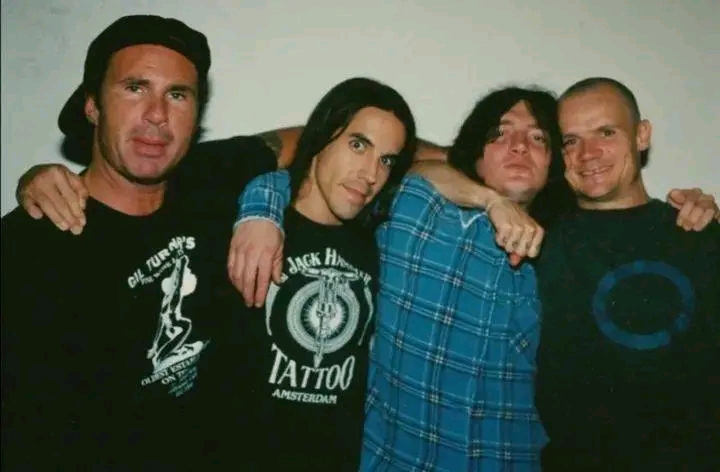On April 18, 1998, John Frusciante returned to the band for the first time since his departure in 1992. After six years and following his rehabilitation, he was reunited with his brothers…Read More
April 18, 1998, stands as one of the most emotional and significant moments in modern rock history. On this day, John Frusciante officially returned to the Red Hot Chili Peppers after a six-year absence that had tested both the guitarist and the band to their limits. His comeback was more than a simple band reunion—it was a story of redemption, resilience, and the unbreakable bond between four musicians who had weathered storms of fame, addiction, and personal struggles.
Frusciante first left the group in 1992 during the height of their success. The Chili Peppers had just released their groundbreaking album Blood Sugar Sex Magik, which catapulted them into global superstardom. While fans embraced the raw funk-rock fusion and Anthony Kiedis’ lyrical intensity, the sudden surge of fame proved overwhelming for the then 22-year-old guitarist. Frusciante, already battling inner conflicts and a growing dependency on drugs, chose to walk away from the spotlight, leaving the band without one of its most vital creative forces.
The years that followed were dark for Frusciante. He retreated from public life and sank deeper into addiction, struggling with isolation and declining health. Rumors often circulated about his deteriorating condition, and at several points, his survival seemed uncertain. Fans who cherished his unique guitar sound feared they had lost him forever. During this time, the band pressed on, recruiting Dave Navarro of Jane’s Addiction to fill the gap. Navarro contributed to their 1995 album One Hot Minute, but despite his talent, the chemistry never matched the natural, instinctive connection that Frusciante had with his bandmates. The Peppers remained successful, but there was always a lingering sense that something essential was missing.
Meanwhile, Frusciante’s personal journey reached a breaking point. By the late 1990s, he entered rehabilitation to confront his addiction and regain control of his life. It was a painful but necessary step. Slowly, with determination and the support of those around him, he began to recover—not only physically but also creatively. As his health improved, so did his desire to reconnect with music and with the people who had once felt like family to him.
That turning point arrived in early 1998. Flea, the band’s bassist and longtime friend, had remained emotionally close to Frusciante despite the distance. Recognizing both his progress and his yearning to play again, Flea reached out to him with an offer: to return to the Red Hot Chili Peppers. It was not a decision made lightly, but for Frusciante, the chance to reunite with Anthony Kiedis, Flea, and Chad Smith symbolized a new beginning.
On April 18, 1998, after six long years away, John Frusciante rejoined the Chili Peppers. The moment was filled with emotion—joy, relief, and gratitude. For the band, it meant they were whole again. For Frusciante, it was an opportunity to start fresh, not as a troubled young star consumed by fame, but as an artist ready to embrace his craft with renewed passion.
The reunion immediately reinvigorated the group. They began writing new material, and the chemistry was undeniable from the start. Ideas flowed with ease, as though no time had passed since their last collaboration. Within a year, this creative burst gave rise to Californication (1999), the album that not only restored their global dominance but also marked one of the most celebrated comebacks in rock music history. Tracks like “Scar Tissue,” “Otherside,” and the title song carried a sense of maturity and vulnerability, reflecting both Frusciante’s personal journey and the band’s collective growth.
Fans welcomed him back with open arms, celebrating his return at live shows and embracing the renewed sound. Critics also took notice, hailing Californication as a masterpiece that combined the band’s signature funk-rock roots with introspection and melodic depth. It became one of their best-selling records, cementing their status as legends.
Looking back, Frusciante’s return was more than just a band decision—it was a powerful symbol of resilience. His story resonated with anyone who had faced personal demons and fought to reclaim their life. The Chili Peppers’ willingness to stand by him, offering both forgiveness and trust, underscored the deep brotherhood that has always defined the group.
Even decades later, April 18, 1998, remains a milestone in the band’s history. It was the day that set the stage for one of the greatest creative resurgences in music. Without that moment, fans may never have heard the soaring guitar lines of Californication, the raw emotion of By the Way (2002), or the ambitious scope of Stadium Arcadium (2006).
John Frusciante’s return stands as a reminder that music is not just about success or fame, but about connection, healing, and the timeless bonds between artists and their audience. His journey from despair to redemption continues to inspire, proving that even in the darkest times, a second chance can change everything.
